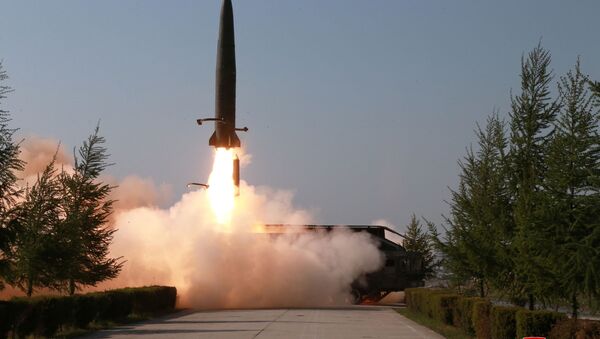On Wednesday, South Korean news agency Yonhap that North Korea test fired two short-range ballistic missiles. South Korean military officials told Yonhap that the missiles were fired eastward from the coastal South Hamgyong Province over the Sea of Japan.
North Korea had also previously test fired two short-range ballistic missiles into the Sea of Japan last week. Shortly thereafter, North Korean state-run media reported that the launches were tests of a new tactical guided weapon and were meant to serve as a warning to South Korea against boosting its military or joining US-led war games.
“They [North Korea] have to develop missiles like everyone else, in a sense. So, that’s always there in the background. The timing of this is a matter of something they have control over. It’s a matter of sending messages, primarily to the US and South Korea, mainly about the [military] exercises. More than that … they signify a lack of commitment by the US about serious negotiations,” Beal told hosts John Kiriakou and Brian Becker, noting that the US and other countries routinely test missiles as well.
“I think we can be pretty sure that 60 countries have missiles. They all have to be tested. So, there must be an awful lot of missile tests that go on … constantly, but of course media cherry picks and gives a completely [deliberately] misleading impression of who is actually doing the most missile tests,” Beal told Sputnik.
In fact, attempting to determine how many missiles the US government has tested in the last year through a simple Google search is futile, Becker noted.
“Google is, you know, an ally of the US government. So, we know they cheat for commercial purposes. Obviously, they do have algorithms which determine priorities, and their priority is consistent with the US government. So, that’s why it’s very difficult to find any information,” Beal explained.
In May, a US test firing of one of its Minuteman III intercontinental ballistic missiles from the California coast was preceded and followed by North Korean missile tests just minutes before and after the American test.
On Monday, South Korean media reported that Seoul plans to send a naval unit, which includes a destroyer, to guard oil tankers passing through the Strait of Hormuz as part of a US-led maritime force in the region, as tensions between the US and Iran continue to increase since the Trump administration reimposed sanctions on Tehran after pulling out of the Joint Comprehensive Plan of Action nuclear deal last year.
“There’s a general history of South Korea being subservient to the US. Don’t forget South Korea as a state was created by the US … So it’s not merely [South Korean President] Moon Jae In,” Beal noted, adding that the ship deployment may have more historical significance than as a simple show of loyalty to the Trump administration to persuade it to negotiate with the North.
“Generally speaking, the establishment, the [US] political establishment, the military establishment, doesn’t want any peaceful resolution in East Asia. They want to keep the tension, because it’s an important part of their forward military strategy in Asia. The containment of China, the containment of Russia, and perhaps they’re also keeping an eye on the Japanese,” Beal explained.


